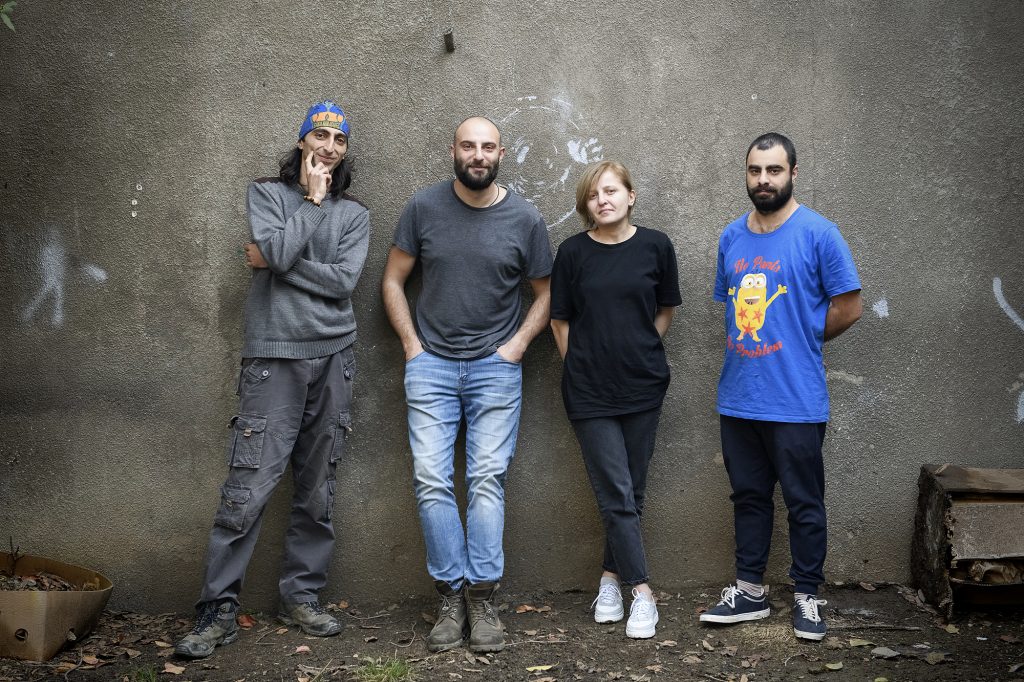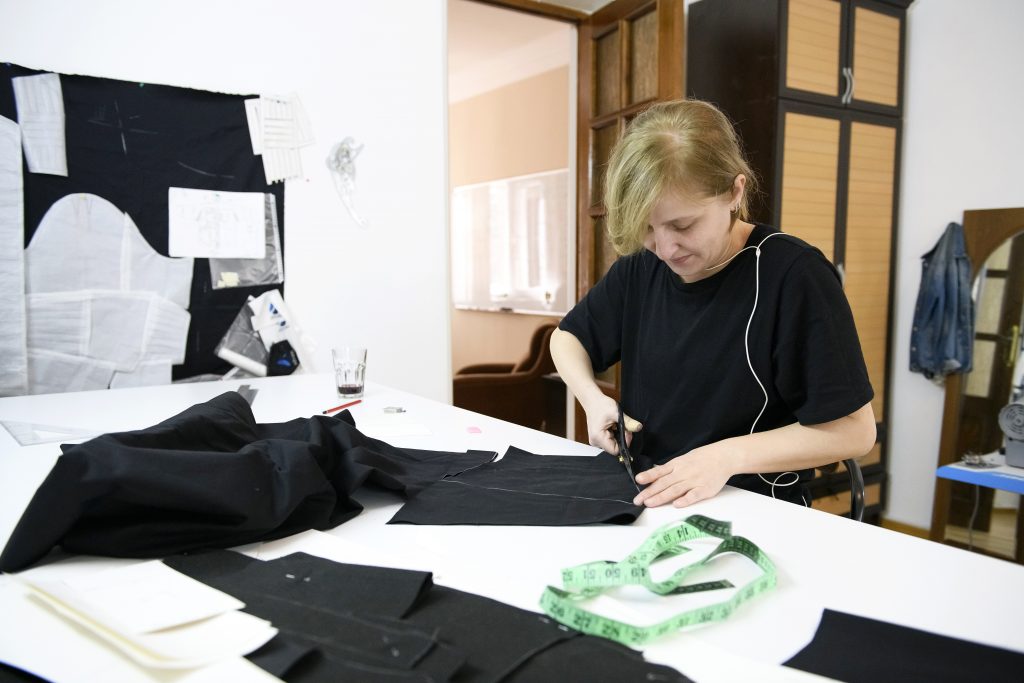
Innovation as a state of mind: Georgian startup Elven tech and its space related future
“It all started with my strange physiology,” Vamekh Kherkheulidze, the CEO of Elven Tech shrugs with an apologetic grin as he sits down in his office in Tbilisi, Georgia. “I am always feeling hot – it’s such a nuisance.”
One particularly unbearable hot summer’s day, Kherkheulidze had enough and came up with an idea.
“I realised that every human being, no matter how much money he or she has, gets uncomfortably hot in such weather. So, I said to myself: there has got to be a solution to this.”
What started off as tinkering with tubes and cooling systems when he was not working as a doctor soon snowballed into a full-time occupation. Today, Elven Tech is pioneering an innovative, fire-resistant, hi-tech protective suit for fire fighters which not only would keep them cool but would also save lives.
“Everyone thinks that firefighter uniforms are flame-proof – but in fact, all over the world, they have very low protection,” explains Kherkheulidze. “Even the best uniforms on the market start burning inside after about eight seconds. We wanted to do better than this. Today, our invention offers protection from fire five times longer than the fire-fighter suits currently being used, while exposed to a temperature of 1100 degree Celsius– 20 percent of the sun’s temperature.”
Elven Tech is a member of the Georgian Apparel and Fashion Association (GAFA), established with support from the EU and the German Government. Support for development of small and medium-sized enterprises is one of the key priorities of the European Union in Georgia. The project is implemented by Deutsche Gesellschaft für Internationale Zusammenarbeit (GIZ) GmbH.
This support includes promotion of business clusters across various sectors of the Georgian economy, from apparel to construction and tourism. Industry clusters help small and medium enterprises team up to become more competitive, while collaborating with learning from each other and external experts, who share valuable industry-insider advice and provide guidance as the businesses grow and develop.
The apparel sector in Georgia has been growing significantly in the years leading up to the Covid-19 outbreak. It has a strong export potential and, dominated by high-quality niche creations, the products are labour-intensive and of high quality, which makes the sector ideal for a cluster approach.
As GAFA’s reputation continues to grow, the number of its members has doubled over the past year. Today, GAFA is operated by a Board of Directors with several working groups in a bid to further accelerate the speed of its members’ development.
“Membership in the cluster exposes the businesses to so many influences and inspirations as they see what others are doing and learn which pitfalls to avoid, enabling them to move to the next level quicker,” says Keti Meparishvili,Manager of the Georgian Apparel and Fashion Association.
“Being in a cluster means we are in close contact with several companies who we may be able to collaborate with in the future, particularly in the sphere of manufacturing,” says Kherkheulidze.
C4D helped Elven Tech put their models to the real-life test, subjecting them to a massive 1100-degree Celsius blaze with flames of 2.5 metres in height which filled the entirety of an abandoned warehouse.
“Cluster4Development hired these places out for us to conduct the test on two occasions. Through this process we were able to identify elements that needed improving,” says Kherkheulidze.
“Testing our products on such a large scale also helped us to promote our innovation to new partners and international investors, which has transformed our business from a local enterprise to something that can potentially have a global reach in helping save lives.”
Georgian Emergency Service firefighting personnel provided safety measures during these tests, which in turn led to Elven’s partnership with Georgia’s emergency authorities, paving the way for further business opportunities.
In the most recent test, Elven Tech’s suit outlasted the closest competitor five times longer.
C4D also helps in other ways, explains Kherkheulidze.
“Our biggest problem is the lack of knowledge and experience in specific fields”.
Clusters4Development paired Elven Tech with international experts with substantial experience in the start-up field and in the domain of Personal Protection Equipment (PPE).

“It was fascinating to find a Georgian start-up working with such passion, know-how and determination on the development of a heat and fire protective product that would surely be a great asset for any firefighter in Georgia or elsewhere,” says Sven Eriskat of infoAid Partners, a consultancy with a long track record of advising companies operating in the field of Technical Textiles and PPE.
“Elven Tech has the potential to develop a PPE product that is commercially viable. We will assist the team by connecting them with key international players in science and industry. Helping Elven Tech with resources to participate in events such as the ‘Aachen-Dresden-Denkendorf International Textile Conference 2021’ has not only furnished the team with valuable insights, but also supported Elven Tech in networking with international researchers and commercial operators.
“Attending the two-day conference was enough to discover new solutions and scientific findings of smart materials that are being actively worked on by the academics and the private sector around the world. I am sure, it will not only serve us to understand the latest trends of the industry but will also help us to define our future plans.” – said Kherkheulidze.
The European market for PPE is growing at a forecasted annual average rate of almost 5% for the next 4-5 years. Although growth is heavily driven by an unprecedented demand for medical and personal hygiene products (due to the pandemic), other market segments are also expanding. Tighter work safety regulations stimulate the demand for PPE used in industry (chemical, construction etc.). PPE used in civil protection units, such as fire brigades, are also subject to strict requirements, covering the full extent of product – from fibre to garment. At the same time, lighter products with the same or a higher protection performance are needed – at a competitive price. Manufacturers capable of offering innovative products that comply with the regulations at competitive prices enjoy very good market prospects.
“Their advice was extremely helpful in helping us to refine our strategic vision, our method of working – also providing many useful contacts of potential investors, while suggesting industry events that would help us get more established,” he adds.
COVID-19
In the midst of Covid-19 pandemic, such external support and network became even more crucial.
“Covid hit us very hard,” explains Alexander Chubinidze, a former genetic scientist who is Elven Tech’s Research and Development Manager.
“We had an important meeting planned with the CEO of a Georgian syndicate of investors – a key contact for us. But then, overnight, the whole country went into lockdown. It was impossible to invite anyone over for a presentation, it was impossible to meet, everything suddenly was cancelled.”
The lockdown resulted in the team also losing their office, as their landlord needed to use the space for working from home himself.
“We rented a small, freezing garage. We worked there in the middle of winter with our hats, gloves and coats. It was quite small – we kept hitting our heads on the ceiling,” laughs ç. “But somehow, it ended up being a place of inspiration,”
From the garage, the team decided to make the most out of the situation. “Covid opened up the possibility to pitch at every startup conference and competition anywhere in the world,” says Kherkheulidze. “We would work like crazy, delivering the same 5-minute pitch five, maybe six times a day, targeting investors anywhere from Australia to Europe.”

The Next Frontier
EU support helped Elven increase their awareness of the importance of safeguarding their intellectual property rights – another key issue for the start-up, since the exact material composition of the firefighter suit is a closely guarded secret, in particular, because the start-up is already thinking on a much (much!) longer range.
“While researching cooling systems, I got into physics of space suits and I realised that the current spacesuits used by NASA were designed and built in the 1960s!,” says Kherkheulidze.
“We know it sounds crazy, but there are no start-ups trying to build an upgraded version.”
“Right now – not in some distant future – people have already started travelling into space as tourists. Soon, this will launch a huge industry, many spacesuits are needed – and no one is doing it,” adds Chubinidze.
“If a spacesuit was built in the 1960s, imagine what we can do now. In the future, we would like to be the first Georgian start-up to fly our country’s flag to space!”